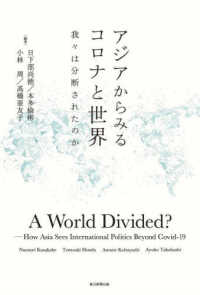- ホーム
- > 洋書
- > 英文書
- > Cinema / Film
Full Description
Francophone Belgian Cinema offers an original critical analysis of filmmaking in an oft-neglected 'national' and regional cinema. The book draws key distinctions between the local, national, small national, regional and transnational frameworks in both representational and industrial terms. Alongside the Dardenne brothers, this book considers four promising Francophone Belgian filmmakers who have received limited critical attention in academic publications on contemporary European cinema: Joachim Lafosse, Olivier Masset-Depasse, Lucas Belvaux and Bouli Lanners. Exploring these filmmakers' themes of post-industrialism, paternalism, the fractured nuclear family and spatial dynamics, as well as their work in the more commercial road movie and polar genres, Jamie Steele analyses their stylistic continuities and filiation. This is complemented by an analysis of how the industrial aspects of film production, distribution and exhibition contribute to the creation of both a regional and transnational cinema.
Contents
Acknowledgements
Introduction: Exploring Nationalisms in Belgium, Brussels and Wallonia
Chapter 1: The (francophone) Belgian film ecosystem: trends in production, distribution and exhibition
Chapter 2: 'No Future': social marginalisation, social precariousness and depictions of Seraing in Le gamin au vélo (Jean-Pierre and Luc Dardenne, 2011) and Deux jours, Une nuit (Jean-Pierre and Luc Dardenne, 2014)
Chapter 3: 'Stills' and fragmented families: contemplating the private sphere in Joachim Lafosse's Wallonia
Chapter 4: From slag heaps to cliffs: the 'marked' regional landscape in Cages (Olivier Masset-Depasse, 2006)
Chapter 5: The francophone Belgian road movie: Eldorado (Bouli Lanners, 2008) and Ultranova (Bouli Lanners, 2005)
Chapter 6: Lucas Belvaux's return: the thriller genre and heists in Liège
Conclusion
Works Cited
Filmography





